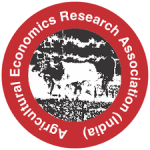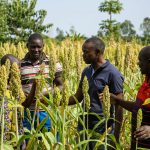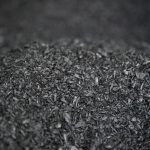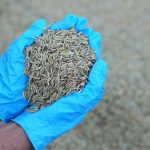Tag: Food & Ag-Science Innovations

Nutrition-Sensitive Food Systems and Biofortified Crops
Abstract The realization that economic growth is a necessary but insufficient condition for improving the nutritional status has led to a paradigm shift in addressing malnutrition through nutrition-sensitive development. Biofortification is one such nutrition-sensitive food system intervention designed to supply crucial micronutrients through staple diets...

In-Mouth, Self-Disintegrating Milk Protein Puffs-I: Process Development
Abstract This study elucidated the reactive role of the supercritical fluid extrusion (SCFX) process along with calcium chelation by added sodium hexametaphosphate (SHMP) in altering the physicochemical properties of milk protein concentrate (MPC) with added sucrose (MPC-S) to make expanded extrudates of defined microstructure that...

Improving Public Sector Plant Breeding for the Future of Food Security
Public plant breeding programs play a central role in tackling local food security challenges around the world, but how can we be sure that they are operating effectively and optimally at the institutional level? In this blog series, the Feed…

Study Reveals Complex Links Between Soil and Human Health
Nutrition doesn’t depend only on the type of food you eat. It is influenced by a complex network of factors, including soil, according to new research from the Tata-Cornell Institute for Agriculture and Nutrition (TCI).
In a study published in…

Soils and Human Health: Communication Between Geo-Environmental, Socio-Demographic and Lifestyle of Rural Tribal Women of Jharkhand, India and Their Mineral Nutrition
Abstract A holistic view on possible determinants of human health within a poor subsistence farming community is important to addressing pressing issues surrounding hidden hunger. This survey study assesses the mineral nutrition of women in rural tribal communities of Jharkhand, India, and its possible connection...

How Biochar Can Help Renew Degraded Tropical Soils
Agricultural soils around the world are under increasing pressure as urbanization covers once prime farmland with concrete and asphalt while intensified agricultural production degrades soil fertility. Yet even as their soils’ fertility declines, farmers around the world will be expected…

Genome Editing: The Next Big Revolution in Indian Agriculture
Innovation has been the foundation of major agricultural advancements that have improved food security in India. While the 1960s saw high-yield dwarf crop varieties enter breeding research, the Green Revolution scaled up breeding for commodity crops to a whole new…

After Conducting a Nutrition Study in India, a TCI Alumna Goes Global
As a TCI scholar pursuing a PhD in international nutrition, Kathryn Merckel led a trial testing the potential of orange-fleshed sweet potato to improve nutritional outcomes in Uttar Pradesh, India. After graduating in 2020, Merckel now works to improve nutrition…

Soil Health: What You Should Know
Healthy soils are key to producing nutritious foods. In hopes of boosting agricultural productivity in India, TCI’s Soil Health Project in Bihar examines the links between soil health, land management, and cropping systems to assess their impact on agricultural yields.…

The Who and Where of Farm-Level Crop Diversity in Bihar
What types of households have more diverse farms, and why does it matter? Spatial crop diversity — growing more than one crop in a field or on a farm simultaneously — has been associated with higher levels of biodiversity, soil…

